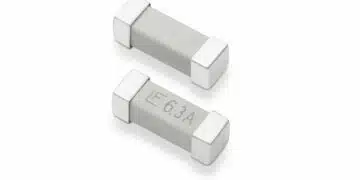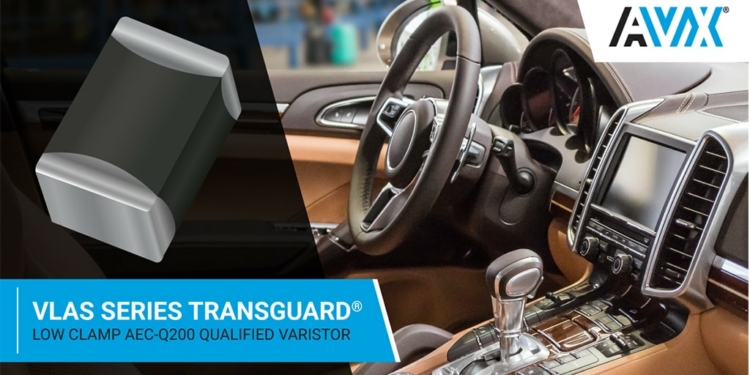Source: AVX news
The new VLAS Series Low-Clamp TransGuard® Automotive MLVs provide high-reliability bidirectional overvoltage protection & broadband EMI/RFI filtering in a single, space-saving SMT device qualified to AEC-Q200 & capable of replacing much larger, two-component TVS diode & EMC capacitor solutions.
FOUNTAIN INN, S.C. AVX Corporation, a leading manufacturer and supplier of advanced electronic components and interconnect, sensor, control, and antenna solutions, released a new series of automotive-qualified multilayer varistors (MLVs) especially designed to exhibit lower breakdown- and clamping-voltage to working-voltage ratios than other standard varistors.
Comprised of zinc-oxide-based (ZnO-based) ceramic semiconductor devices with nonlinear, bidirectional voltage-current (V-I) characteristics similar to those of back-to-back Zener diodes, but with greater current and energy handling capabilities and the addition of EMI/RFI attenuation, the new VLAS Series Low-Clamp TransGuard® Automotive MLVs combine bi-directional overvoltage circuit protection and broadband EMI/RFI filtering functions in a single, space-saving, surface-mount (SMT) device that is qualified to AEC-Q200, proven to deliver high-reliability performance, and capable of achieving very low clamping-to-working-voltage ratios that were previously only achievable with transient voltage suppression (TVS) diodes.
This allows the new VLAS Series MLVs to extend the multifunctional advantages of varistor technology to sensitive automotive, industrial, and general electronics applications that require tighter clamping voltage performance for enhanced overvoltage protection, as well as the extreme optimization of physical space, including infotainment systems, engine control units (ECUs), microcontroller units (MCUs), and displays.
The series also exhibits high current- and energy-handling capabilities, very fast, sub-nanosecond (<1nS) response times to ESD strikes, multiple-strike capabilities, high energy absorption (i.e., load dump), low leakage, and excellent solderability; doesn’t require any current or energy derating over the entire range of rated operating temperatures, which spans -55°C to 125°C; and can provide significant space savings when used to replace TVS diode and electromagnetic compatibility (EMC) capacitor pairings. It is currently available in four chip sizes (0603, 0805, 1206, and 1210) rated for 16VDC working voltages, 35VDC maximum (30VDC typical) clamping voltages, 0.1–1.6J energy ratings, 0.7–3J load dump energy, 50–500A peak current ratings, and 400–5,000pF capacitance.
“Our new VLAS Series Low-Clamp TransGuard Automotive Multilayer Varistors extend the multifunctional, space-saving, and high-reliability performance advantages of varistor technology to applications that require very tight clamping-to-working-voltage ratios, including automotive and industrial systems that need to be protected from overvoltage in order to prevent damage and downtime and to ensure the safety of operators and passengers,” said Jiri Machanicek, product marketing manager for circuit protection at AVX.
“The new VLAS Series MLVs provide TVS protection in their on-state and broadband EMI/RFI filtering in their off-state, don’t require any current or energy derating over the entire rated operating temperature range, and have a compact form factor that satisfies increasingly common cross-market demands for lightweight, space-saving components.”
The new VLAS Series Low-Clamp MLVs also have RoHS-compliant nickel-barrier-over-pure-tin (Ni/Sn) terminations compatible with lead-free solder processes and are compliant with the ESD performance requirements defined in the AEC-Q200, IEC 61000-4-2, and ISO 10605 standards.
They are supplied in tape-and-reel packaging for compatibility with automated pick-and-place machinery, are available on 7” or 13” reels in quantities of 1,000, 4,000, and 10,000 pieces, and have a moisture sensitivity level of one (MSL 1), which mitigates common concerns about packaging, storage, and the timing of mounting and reflow processes. Lead-time for the series is currently 14 weeks.
































